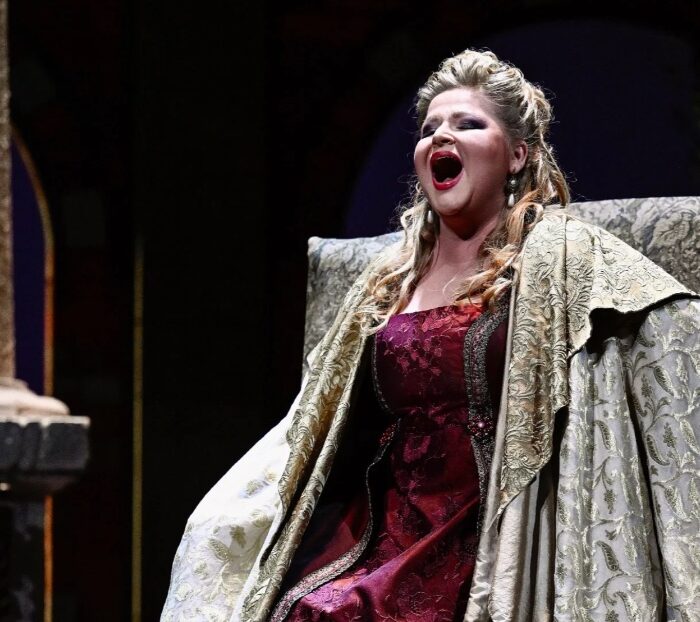
An Indomitable Force – Mezzo-Soprano Annalisa Stroppa on Playing ‘Carmen’ & Rosina in ‘Il Barbiere Di Siviglia
By David SalazarWhen she was a young girl, mezzo-soprano Annalisa Stroppa would come home from school to a healthy diet of “The Three Tenors” and Mario del Monaco. Her grandparents idolized these artists and quickly impregnated their granddaughter with an unshakeable passion for opera.
“That’s when I discovered I had a special voice and from then on, there was no one stopping my dream of singing,” she told OperaWire during an exclusive interview.
These formative experiences got the young girl learning all the great operatic arias and by the time she was eight or nine, Stroppa was singing such arias as “Nessun Dorma” and “O Sole Mio” at family gatherings. A liberal arts degree, a Master’s Degree in Education Sciences and a degree in singing with honors from the Conservatory of Brescia would catapult her into the operatic scene.
“I was involved in a lot of competitions to test my potential and see if I really belonged in this world because it is so difficult to truly succeed in it,” she stated. “And from the start the results were good. I would finish third or second or first in all of them and I decided that this was the path I wanted to take.”
Her international debut came in “I Due Figaro” by Mercadante with none other than Riccardo Muti at the helm. The rest, as they say, is history.
The mezzo-soprano noted a passionate love for strong women in her characterizations and so it is fitting that her two of her three immediate assignments allow her to become two of opera’s most powerful women.
The Indomitable Viper
Stroppa is currently in the midst of a run of Rossini’s “Il Barbiere di Siviglia” in Monte Carlo in a production by Corrado Rovaris. Stroppa is no stranger to the character of Rosina and actually made her Rome debut with this opera, which opened numerous doors to her professionally. Rosina is the heroine of the piece outsmarting all the men around her to ultimately get what she wants, the Count Almaviva.
“I love this character so much. It is one of the roles that I have interpreted most often and I believe it is truly mine,” Stroppa enthused. “I find a lot of similarities with her and myself. She is young, full of life, determined and awake to life. She loves and believes strongly in her love. She is truly a modern woman with grace and ready to go after what she wants. And she’s also very proud. I see myself in these aspects of her character.
“The phrase that best exemplifies how I see Rosina is ‘Io sono docile, sono ubbidiente, mi lascio reggere, mi fo’ guidar!!! Ma se mi toccano dov’è il mio debole sarò una vipera, sarò! [I can be docile, obedient. I allow myself to be ruled and guided. But if you mistreat me, I can be a viper],” she added.
While she has interpreted the character throughout her career, Stroppa noted that there remain numerous difficulties to conquering the unconquerable Rosina.
“The greatest difficulty for me is to really take care of every sound without oversimplifying or ignoring details so that interpretation fits in with what Rossini truly wanted. Rossini demands perfect coloratura and legato,” she noted. “Moreover, you have to truly know how to execute the declaimed phrases of each recitative that is all wrapped up in the beautiful writing of ‘Barbiere.’”
The Indomitable Gypsy
After “Barbiere,” Stroppa makes a stop in Amsterdam to perform in Verdi’s “Rigoletto.” Then she heads over to Austria to perform the title role in Bizet’s “Carmen” at the Bregenzer Festspiele.
Like Rosina, Carmen takes orders from no one except herself. She gives her love freely but is unwilling to let anyone try to seize control over her.
“Carmen is a modern woman with tremendous complexity and coherence in her ideas,” Stroppa explained about her view on the character. “To sing her is to sing about four or five roles in one. She is so rich and profound and in this role, you find so many different kinds of singing that reveal her different emotions. From the popular dance of the habanera and seguidille it moves into a seductive legato with the tenor in the second act and then to an intense drama with the cards aria and finale. You also have to sing and dance, which is never easy. You have to calibrate your energy really well.”
For Stroppa, the most exciting part of the opera is that second act seduction of Don José.
“It is here that her fire and tremendous temper emerges,” she noted. “I also love the end as a culmination and synthesis of the emotional tension that has developed over the course of the entire drama.”
The Indomitable Passion
The “Carmen” run lasts an entire month from July 19 to August 20, a period of time that the mezzo spends away from her family.
“It is so hard to be away from those that you love so much,” she acknowledged. “It is almost impossible to often keep those relationships with family and friend. But I am convinced of one thing – those that love you and support you will always be with you, regardless of the distance. In that respect, I feel very fortunate because I have overcome so many difficulties thanks to the people that are with me and have always showered me with love and support.”
Despite that massive difficulty in her life, Stroppa is adamant that she would not change it for the world.
“I love this career. For me singing is not only a profession, it is my life,” she exclaimed. “Doing this is not just work. It has to be our passion.
“It is what I always wanted since I was a young girl and it is so thrilling to have my dream come true.”
Another dream for Stroppa is the prospect of singing Charlotte in Massenet’s “Werther.”
“I find that role so marvelous because I find her so similar to me. She is a simple girl, sensible and full of intense emotions,” Stroppa concluded. “I want to keep on learning and enjoying every experience I have onstage and growing more and more.”


